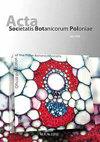C4植物玉米叶鞘和束鞘叶绿体光合作用的光依赖反应。近年来我们的观点发生了怎样的变化
IF 1.1
4区 生物学
Q3 PLANT SCIENCES
引用次数: 1
摘要
植物在其环境中会经历一系列的光照强度和质量。叶片在入射光中受到空间和时间梯度的影响,这对光合碳同化具有重要影响。植物通过发展一系列机制来适应光照,从叶片形态的调整到光合器官化学计量的变化。在C4植物中,光照强度是在最佳温度下光合作用的主要限制因素。在有限的光照下,尚不清楚是否所有因素(如温度、矿物质营养、供水)都是共同限制的,或者是否存在一个主要限制。光照质量和强度的差异对C4光合作用有着深远的影响,其中的途径需要叶肉和束鞘循环的代谢协调。玉米叶肉和束鞘叶绿体中响应光的线性与环状电子通量(NADP苹果酸酶C4亚型)的变化可能导致C3和C4途径的协调不平衡。此外,玉米中两种类型叶绿体的类囊体复合物的重排优化了叶肉和束鞘细胞之间的光能分布,也可能参与能量耗散。这篇综述旨在强调对玉米束鞘叶绿体中光系统II的功能以及超级和巨型复合物在类囊体中的作用的理解的变化。本文章由计算机程序翻译,如有差异,请以英文原文为准。
Light-Dependent Reactions of Photosynthesis in Mesophyll and Bundle Sheath Chloroplasts of C4 Plant Maize. How Our Views Have Changed in Recent Years
Plants experience a range of light intensities and qualities in their environment. Leaves are subjected to spatial and temporal gradients in incident light, which has major consequences in the photosynthetic carbon assimilation. Plants acclimate to light by developing a range of mechanisms, from adjustments in leaf morphology to changes in the photosynthetic apparatus stoichiometry. In C4 plants, light intensity is a major limiting factor for photosynthesis at optimum temperatures. Under limiting light, it is not clear if all of factors (e.g., temperature, mineral nutrition, water supply) are co-limiting or if there is one primary limitation. Differences in light quality and intensity have a profound impact on C4 photosynthesis, where pathways require metabolic coordination of the mesophyll and bundle sheath cycles. Changes in the linear versus cyclic electron flux in maize (NADP-malic enzyme C4 subtype) in the mesophyll and bundle sheath chloroplasts in response to light may lead to an imbalance in the coordination of the C3 and C4 pathways. Additionally, the rearrangement of the thylakoid complexes of both types of chloroplasts in maize optimizes the light energy distribution between the mesophyll and bundle sheath cells and may also participate in energy dissipation. This review aims to highlight the changes in the understanding of the functions of photosystem II in maize bundle sheath chloroplasts and the role of super and megacomplexes in the thylakoids.
求助全文
通过发布文献求助,成功后即可免费获取论文全文。
去求助
来源期刊
CiteScore
2.00
自引率
10.00%
发文量
18
审稿时长
1 months
期刊介绍:
The journal has been published since 1923 and offers Open Access publication of original research papers, short communications, and reviews in all areas of plant science, including evolution, ecology, genetics, plant structure and development, physiology and biochemistry.

 求助内容:
求助内容: 应助结果提醒方式:
应助结果提醒方式:


